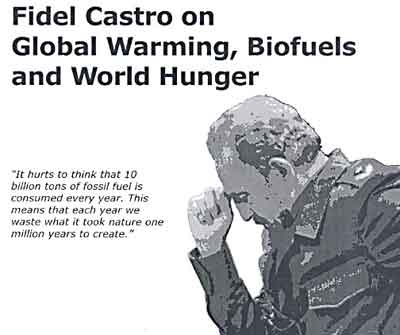A couple of weeks ago, while I was on vacation, my cell phone rang; it was Jorge Bolanos, the head of the Cuban Interest Section (we of course don't have diplomatic relations with Cuba) in Washington. "I have a message for you from Fidel," he said. This made me sit up straight. "He has read your Atlantic article about Iran and Israel. He invites you to Havana on Sunday to discuss the article." I am always eager, of course, to interact with readers of The Atlantic, so I called a friend at the Council on Foreign Relations, Julia Sweig, who is a preeminent expert on Cuba and Latin America: "Road trip," I said.I guess we won't be seeing any more happy, happy pictures:
I quickly departed the People's Republic of Martha's Vineyard for Fidel's more tropical socialist island paradise. Despite the self-defeating American ban on travel to Cuba, both Julia and I, as journalists and researchers, qualified for a State Department exemption. The charter flight from Miami was bursting with Cuban-Americans carrying flat-screen televisions and computers for their technologically-bereft families. Fifty minutes after take-off, we arrived at the mostly-empty Jose Marti International Airport. Fidel's people met us on the tarmac (despite giving up his formal role as commandante en jefe after falling ill several years ago, Fidel still has many people). We were soon deposited at a "protocol house" in a government compound whose architecture reminded me of the gated communities of Boca Raton. The only other guest in this vast enclosure was the president of Guinea-Bissau.
I was aware that Castro had become preoccupied with the threat of a military confrontation in the Middle East between Iran and the U.S. (and Israel, the country he calls its Middle East "gendarme"). Since emerging from his medically induced, four-year purdah early this summer (various gastrointestinal maladies had combined to nearly kill him), the 84-year-old Castro has spoken mainly about the catastrophic threat of what he sees as an inevitable war.
I was curious to know why he saw conflict as unavoidable, and I wondered, of course, if personal experience - the Cuban missile crisis of 1962 that nearly caused the annihilation of most of humanity - informed his belief that a conflict between America and Iran would escalate into nuclear war. I was even more curious, however, to get a glimpse of the great man. Few people had seen him since he fell ill in 2006, and the state of his health has been a subject of much speculation. There were questions, too, about the role he plays now in governing Cuba; he formally handed off power to his younger brother, Raul, two years ago, but it was not clear how many strings Fidel still pulled....MORE

Raúl Castro welcomes Iranian president Mahmud Ahmadinejad
to the summit of the Non-Aligned Movement in Havana.
September 2006 (Source: Reuters).
Previously:
September, 2007
Fidel Castro, Global Warming,W. and Apec
The Cuban Commander-in-Chief is renowned for his oratory. A Google search for: Fidel, lengthy, speeches; gives you 120K hits. Even in translation it can be mesmerizing....February, 2008:
...And from the link-vault:
Fidel: "Cool, More Time to Blog!"
Last year we linked* (and here) to some of Fidel's thoughts on global warming.
Here are some of his thoughts on energy:
Oil costs and development
Reflections by Fidel Castro Ruz
Here's his homepage.
